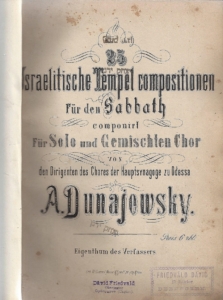Av Harachamim by Abraham Dunajewski
By Vlad Dunaevsky
Olga and Vlad Dunaevsky are the new members of HBT since November 2023.
Their HBT journey started after the October 7, 2023, terrible events. They came to HBT to participate in Koolam (singing together) and met Rabbi Yael Splansky and cantor David Rosen. Rabbi Splansky invited them to Kabbalat Shabbat. In a matter of a few weeks, they became the proud members of HBT.
 Vlad joined the HBT choir at the end of February 2024 and found the name Abraham Dunajewsky in the rehearsal note sheets: what a wonderful and shocking surprise!
Vlad joined the HBT choir at the end of February 2024 and found the name Abraham Dunajewsky in the rehearsal note sheets: what a wonderful and shocking surprise!
Composer Abracham Dunajewsky (Dunaevsky) (1843 – 1911) is his 2x Great Grandfather!
Judaism, Jewish culture, synagogues and Rabbis names were repressed in Soviet Russia. The name of a “synagogue composer A. Dunajewsky” was completely unknown to the public. Vlad was born and lived in Russian Siberia with a hidden identity, although well aware of antisemitism and the terrible crimes of the Holocaust.
Abraham Dunaevsky (1843-1911) was born in the Russian Empire. He became a composer and conductor who flourished in a main synagogue in Odessa (Ukraine).
Abraham Dunaevsky was one of the composers of the German school. The score was written for a mixed choir, that is, for a Reform synagogue, where women were allowed to sing in liturgical singing. Odessa also had a fairly advanced opera house. Modern operas were performed there – Meyerbeer, Bellini, Donizetti, Verdi.
In 1893, Abraham published his first book in German and transliterated it into Hebrew. The title translates to “25 Jewish Temple Compositions for the Sabbath: Composed for Solo and Mixed Choir. ” The book was distributed to Reform synagogues in Europe and America. The book was presented to the very famous Russian Jewish philanthropist Baron Ginzburg, but it was kept in the music fund archive of the Choral Synagogue (St. Petersburg. Russia) for more than a Hundred years in Soviet Russia. Only in 2000 (100 years later!!!) His music was performed for the first time in Russia. What a shame!!!
The chants of Abraham Dunaevsky sound in Hebrew – and this is their only Jewish feature. The music is similar to choruses from Italian or French romantic opera, to oratorio works of the 19th century, to cheerful German choral songs. If this was real Jewish music at that time, then Mendelssohn and Meyerbeer worked in line with the national tradition. Dunaevsky’s score quite stands up in comparison with these famous masters.
It is distinguished by its developed texture and that lively relief of the rhythmic pattern, which even in the most devoted author reveals a passionate musical playwright. The ear that was looking for sad Jewish exoticism found nothing in this music. Chants addressed to God and cheerful hits addressed to the masses have a common basis, mixed with expressive harmony, genre rhythms and bright song melodies.
Now, 130 years later, Vlad started learning the music of his great-great-grandfather in the choir of HBT! Isn’t it a miracle?!
Thank you to HBT’s amazing clergy team and wonderful members!




